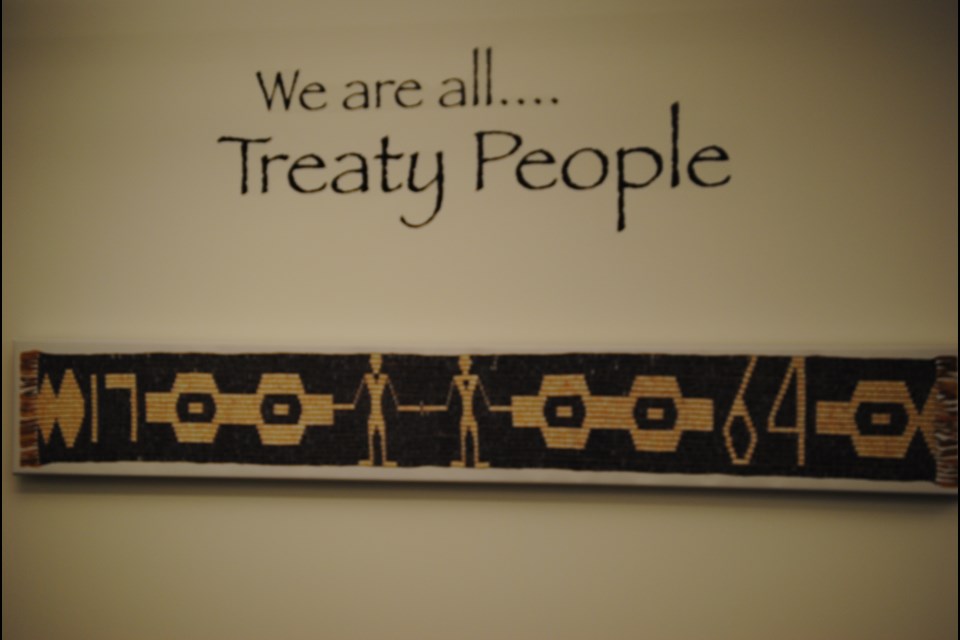Two people with vastly different backgrounds and upbringings working toward a common goal, encapsulating the struggle for truth and reconciliation in Canada.
As part of a packed itinerary for Nipissing University's celebrations for Indigenous Week, the school unveiled the RBC Treaty Learning Centre, and also launched the Reconciliation North Bay initiative.
Some of the highlights of the day's festivities were the anecdote-filled speeches given by the Honourable David Zimmer, Minister of Indigenous Relations and Reconciliation, and Maurice Switzer, Ontario Human Rights Commissioner.
Zimmer, MPP for Willowdale, began his remarks by reiterating one of the themes of the week, that "we are all treaty people."
He told a story about a treaty map that he keeps on the wall of his office. A businessman from the south visited the minister, who he described "as successful, engaged in his community, sat on the hospital board, lots of community work...he came to see me on an unrelated matter.
"He spotted the treaty map on the wall and asked about it," continued Zimmer.
"I replied that it was a treaty map of Ontario (see gallery). I took him over and visually walked him through. In the south, the treaties are dated from the 18th century, and we worked our way up to the north-west.
"I don't know what to say," said the businessman, "I consider myself an informed citizen, and I had no idea that there were 133 First Nations in Ontario, that there are 46 treaties in Ontario, that virtually all of the province is covered by a treaty."
Zimmer asked the man what he did know about treaties. The man replied, "I knew there was a reservation in Cornwall. Big cigarette problem there. I know there's a Chippewa First Nation near London, Ont. And, I know there's one in Brampton. The other one I know of is Rama because there's a casino there."
"That was the extent of his knowledge of First Nations. He apologized for his ignorance. To his credit, he decided that he was going to inform himself. He asked me to send him a map, which I did. He hung it in his corporate office, and he asked me to send some people to his office, because he wanted to understand, and he wanted his employees to understand," said Zimmer.
"That was three years ago, but if a moderate, well-educated person, if that was his level of knowledge, I thought to myself that we have a huge challenge ahead," observed Zimmer.
Next to the podium was Switzer, who is a citizen of the Mississaugas of Alderville First Nation.
"Reconciliation is about listening. That's how you learn, by listening. The biggest challenge with reconciliation is education. Education is the key to all of the world's problems," began Switzer.
"The truth part is about learning and education. The reconciliation part that's going to be about political will and action because as Indigenous people, we have heard lots of words. I can remember June 11, 2008, a former prime minister stood up in the House of Commons saying the warmest, tender things, and then he imposed legislation on Indigenous people that were a travesty," said Switzer.
"Action is going to put some meat on the bones of the truth," he continued.
"I went to the same schools as most journalists, most politicians, and there were all sorts of things I didn't learn in school that I should have. Not all Indigenous people know as much about treaties as we would like," observed Switzer.
In the spirit of continued education and discussion about truth and reconciliation, Nipissing University opened the RBC Treaty Learning Centre. The Centre "offers space for hosting talks that will provide insight into treaty relationships in Canada and will house archival maps, publications, curriculum resources and a replica wampum belt gifted to the RBC Treaty Learning Centre by Anishnabek, Union of Ontario Indians."
The initiative Reconciliation North Bay will be community-supported by all pertinent sectors, including business, education, social service, political, justice, arts, and faith. The goal is to increase the understanding of, and to work towards reconciliation.
